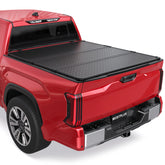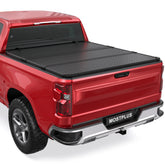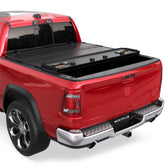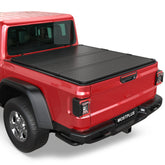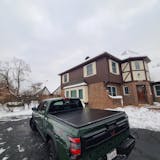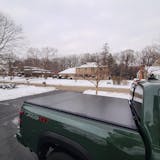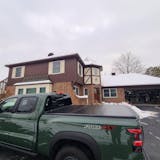Are Tonneau Covers Waterproof?
Tonneau covers are popular accessories for truck owners, providing protection to the bed of the truck and its contents. One common question that arises among truck enthusiasts is whether tonneau covers are waterproof. In this article, we will delve into the features of tonneau covers related to waterproofing and explore the factors that can affect their water-resistant capabilities.
Understanding Tonneau Covers
Tonneau covers come in various designs, including roll-up, folding, retractable, and hard or soft covers. They serve multiple purposes, such as improving fuel efficiency, enhancing security, and protecting cargo from the elements. The degree of water resistance largely depends on the specific type and design of the tonneau cover.
Types of Tonneau Covers
Soft Tonneau Covers
Soft tonneau covers, often made from vinyl or canvas, are a popular and economical choice. While they provide protection against light rain and dust, they may not be entirely waterproof. Water can seep through seams, zippers, or areas with less tight-fitting designs.
Hard Tonneau Covers
Hard tonneau covers, constructed from materials like fiberglass or aluminum, generally offer better protection against water intrusion. However, their design also plays a crucial role in determining their water-resistant capabilities.

Waterproof Features
Manufacturers often incorporate specific features to enhance the water-resistant qualities of tonneau covers:
Sealed Seams
Tonneau covers with sealed seams are less likely to allow water penetration. The seams are treated or covered to prevent water from seeping through the stitching.
Rubber Seals and Gaskets
Many high-quality tonneau covers come equipped with rubber seals and gaskets. These are strategically placed along the edges and joints to create a watertight seal when the cover is closed.
Drainage Systems
Some tonneau covers feature built-in drainage systems to channel water away from the bed of the truck. These systems help prevent water pooling, reducing the risk of leaks.
Tight-Fitting Designs
Tonneau covers that fit snugly around the edges of the truck bed are generally more effective at keeping water out. A tight fit minimizes gaps where water could enter.
Water-Resistant Materials
The choice of materials significantly impacts a tonneau cover's ability to repel water. High-quality vinyl, treated canvas, and water-resistant coatings contribute to better protection against the elements.
Factors Affecting Water Resistance
Age and Wear
Over time, tonneau covers may experience wear and tear, compromising their water-resistant capabilities. Regular maintenance, such as cleaning and applying protective treatments, can help extend their lifespan and effectiveness.
Installation Accuracy
Proper installation is crucial for ensuring the water resistance of a tonneau cover. Gaps or misalignments during installation can create entry points for water.
Type of Truck Bed
The design of the truck bed itself can impact water resistance. Some beds may have features that make it easier for water to accumulate or seep in, regardless of the tonneau cover type.
Weather Conditions
While tonneau covers are designed to withstand various weather conditions, extreme weather events like heavy rainstorms may challenge even the most water-resistant covers. Adequate maintenance and occasional checks can help ensure the cover's integrity.

Tips for Maintaining Water Resistance
To maximize the water-resistant capabilities of a tonneau cover, truck owners can follow these maintenance tips:
Regular Cleaning
Cleaning the tonneau cover helps remove dirt, debris, and contaminants that could compromise its water resistance. Use mild soap and water, avoiding harsh chemicals that may damage the cover material.
UV Protection
Prolonged exposure to sunlight can degrade the materials of a tonneau cover, affecting its water resistance. Applying UV protectant specifically designed for the cover material can help mitigate this issue.
Inspect Seals and Seams
Periodically inspect the rubber seals, gaskets, and seams for any signs of wear or damage. Promptly addressing issues can prevent water infiltration.
Avoiding Overloading
Overloading the truck bed can strain the tonneau cover and potentially compromise its water resistance. Adhering to the manufacturer's recommended weight limits is essential.
Check Drainage Systems
For tonneau covers equipped with drainage systems, ensure that the channels are clear of debris. Regularly inspect and clean these components to maintain proper water drainage.
Conclusion
In conclusion, the water resistance of tonneau covers depends on various factors, including their type, design, and the materials used. While many tonneau covers are designed to be water-resistant, it's essential for truck owners to consider additional features, perform regular maintenance, and be mindful of external factors that may affect their effectiveness. By understanding these aspects and taking appropriate measures, truck owners can ensure that their tonneau covers provide reliable protection against the elements.
Featured Products
- $479.99
$499.99- $479.99
- Unit price
- / per
- $549.99
$549.99- $549.99
- Unit price
- / per
- $489.99
- $489.99
- Unit price
- / per
- $469.99
$489.67- $469.99
- Unit price
- / per
